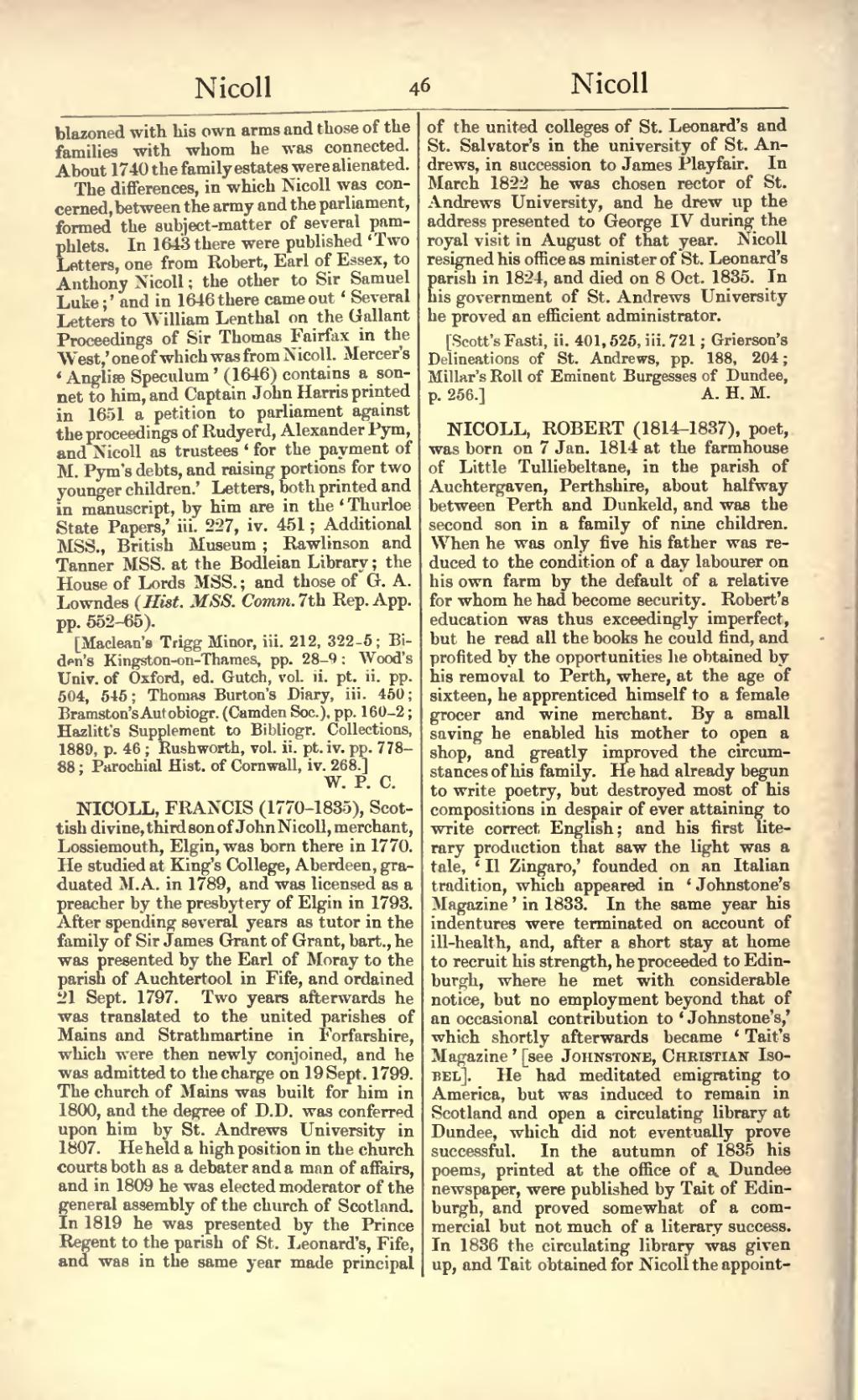blazoned with his own arms and those of the families with whom he was connected. About 1740 the family estates were alienated.
The differences, in which Nicoll was concerned, between the army and the parliament, formed the subject-matter of several pamphlets. In 1643 there were published ‘Two Letters, one from Robert, Earl of Essex, to Anthony Nicoll; the other to Sir Samuel Luke;’ and in 1646 there came out ‘Several Letters to William Lenthal on the Gallant Proceedings of Sir Thomas Fairfax in the West,’ one of which was from Nicoll. Mercer's ‘Angliæ Speculum’ (1646) contains a sonnet to him, and Captain John Harris printed in 1651 a petition to parliament against the proceedings of Rudyerd, Alexander Pym, and Nicoll as trustees ‘for the payment of M. Pym's debts, and raising portions for two younger children.’ Letters, both printed and in manuscript, by him are in the ‘Thurloe State Papers,’ iii. 227, iv. 451; Additional MSS., British Museum; Rawlinson and Tanner MSS. at the Bodleian Library; the House of Lords MSS.; and those of G. A. Lowndes (Hist. MSS. Comm. 7th Rep. App. pp. 552–65).
[Maclean's Trigg Minor, iii. 212, 322–5; Biden's Kingston-on-Thames, pp. 28–9; Wood's Univ. of Oxford, ed. Gutch, vol. ii. pt. ii. pp. 504, 545; Thomas Burton's Diary, iii. 450; Bramston's Autobiogr. (Camden Soc.), pp. 160–2; Hazlitt's Supplement to Bibliogr. Collections, 1889, p. 46; Rushworth, vol. ii. pt. iv. pp. 778–88; Parochial Hist. of Cornwall, iv. 268.]
NICOLL, FRANCIS (1770–1835), Scottish divine, third son of John Nicoll, merchant, Lossiemouth, Elgin, was born there in 1770. He studied at King's College, Aberdeen, graduated M.A. in 1789, and was licensed as a preacher by the presbytery of Elgin in 1793. After spending several years as tutor in the family of Sir James Grant of Grant, bart., he was presented by the Earl of Moray to the parish of Auchtertool in Fife, and ordained 21 Sept. 1797. Two years afterwards he was translated to the united parishes of Mains and Strathmartine in Forfarshire, which were then newly conjoined, and he was admitted to the charge on 19 Sept. 1799. The church of Mains was built for him in 1800, and the degree of D.D. was conferred upon him by St. Andrews University in 1807. He held a high position in the church courts both as a debater and a man of affairs, and in 1809 he was elected moderator of the general assembly of the church of Scotland. In 1819 he was presented by the Prince Regent to the parish of St. Leonard's, Fife, and was in the same year made principal of the united colleges of St. Leonard's and St. Salvator's in the university of St. Andrews, in succession to James Playfair. In March 1822 he was chosen rector of St. Andrews University, and he drew up the address presented to George IV during the royal visit in August of that year. Nicoll resigned his office as minister of St. Leonard's parish in 1824, and died on 8 Oct. 1835. In his government of St. Andrews University he proved an efficient administrator.
[Scott's Fasti, ii. 401, 525, iii. 721; Grierson's Delineations of St. Andrews, pp. 188, 204; Millar's Roll of Eminent Burgesses of Dundee, p. 256.]
NICOLL, ROBERT (1814–1837), poet, was born on 7 Jan. 1814 at the farmhouse of Little Tulliebeltane, in the parish of Auchtergaven, Perthshire, about halfway between Perth and Dunkeld, and was the second son in a family of nine children. When he was only five his father was reduced to the condition of a day labourer on his own farm by the default of a relative for whom he had become security. Robert's education was thus exceedingly imperfect, but he read all the books he could find, and profited by the opportunities he obtained by his removal to Perth, where, at the age of sixteen, he apprenticed himself to a female grocer and wine merchant. By a small saving he enabled his mother to open a shop, and greatly improved the circumstances of his family. He had already begun to write poetry, but destroyed most of his compositions in despair of ever attaining to write correct English; and his first literary production that saw the light was a tale, ‘Il Zingaro,’ founded on an Italian tradition, which appeared in ‘Johnstone's Magazine’ in 1833. In the same year his indentures were terminated on account of ill-health, and, after a short stay at home to recruit his strength, he proceeded to Edinburgh, where he met with considerable notice, but no employment beyond that of an occasional contribution to ‘Johnstone's,’ which shortly afterwards became ‘Tait's Magazine’ [see Johnstone, Christian Isobel]. He had meditated emigrating to America, but was induced to remain in Scotland and open a circulating library at Dundee, which did not eventually prove successful. In the autumn of 1835 his poems, printed at the office of a Dundee newspaper, were published by Tait of Edinburgh, and proved somewhat of a commercial but not much of a literary success. In 1836 the circulating library was given up, and Tait obtained for Nicoll the appoint-
